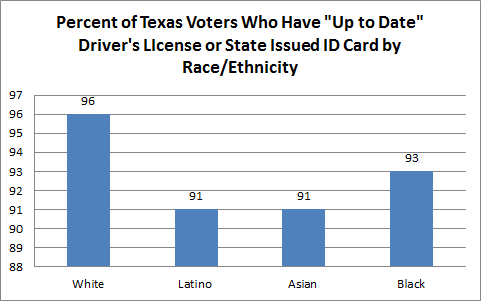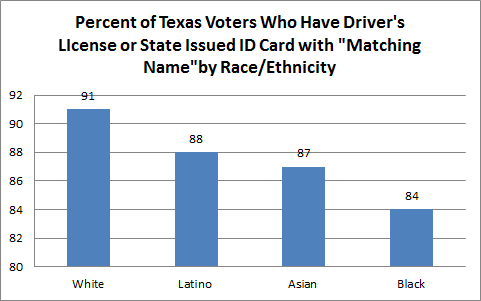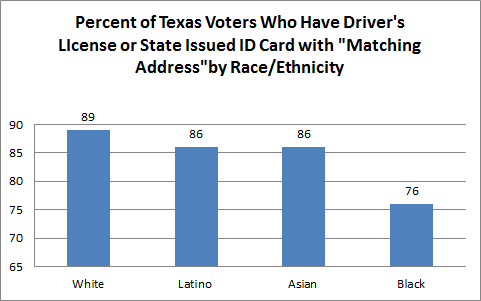By Gabriel R. Sanchez, Stephen A. Nuño, and Matt A. Barreto
Last week the Department of Justice blocked the Texas photo-identification law that requires voters in the state to show a state issued photo-ID to vote, stating that the state of Texas failed to demonstrate that the law is not discriminatory by design against Hispanic voters. This follows a similar move in December by the Justice Department to block South Carolina’s new photo-ID law on the grounds that it disproportionately impacted African American voters. The intense legal debate surrounding these laws has only escalated as we approach the 2012 election, as critics contend that these laws will have a negative impact on the turnout of Democratic voters.
The Texas case is based on the requirement of the Voting Rights Act that jurisdictions that have a history of suppressing minority voting, such as Texas, must provide evidence that any changes to voting rules would not have a disproportionate effect on minority voters. This is an important difference from the Crawford v. Marion County Election Board decision of the Supreme Court which upheld the stringent photo identification policy for voters of Indiana, but did not involve the higher standards of the Voting Rights Act.
In May of 2011 we posted a blog to Latino Decisions focused on the question of … whether minority voters across the United States are less likely to have access to the forms of identification required by many of these new laws. In that report our findings focused on 2008 survey data indicated that Latino, African American, and Asian American voters were all less likely to have an “up to date” driver’s license or state issued identification card. The purpose of this brief blog report is to isolate the Texas respondents from the 2008 survey in an effort to determine whether the Texas law will disproportionately impact minority voters.
Access to Valid ID in Texas
To determine the relative possession of valid forms of identification we rely on the Collaborative Multi-Racial Political Study (2008), a national telephone survey (n= 4,563) of registered voters who were likely to vote in the 2008 presidential election. This analysis isolates respondents from the Texas sample (n=569). In this survey, we ask likely voters if they currently had a valid driver’s license or state issued photo-ID. Respondents are then asked if this ID is not expired, and if the name and address on that ID matches that on their voter registration record. Thus, we are able to provide a strong assessment of how many likely voters within the electorate lack acceptable photo-identification as defined by the Texas law. Furthermore, with over-samples of African Americans, Asian Americans, and Latinos, this data-set provides the ideal instrument to test whether access to photo-identification varies across race, ethnicity, and nativity.
It is important to note that the research design focuses on registered and likely voters. This is an ideal population for this analysis, as those found to be lacking valid identification are likely to attempt to vote in upcoming elections, and thus will be impacted by more stringent voting requirements. This, however, ensures that the data will provide a conservative estimate of citizens who lack valid identification, as likely voters typically have greater resources than non-voter. Please see cmpstudy.com for more information about this survey.
The overwhelming majority of likely voters in Texas state that they have a “driver’s license or state-issued identification card” when asked this initial question. However, there are some important racial and ethnic differences, with 98% of whites, 96% of Latinos, 93% of African American, and 92% of Asian American likely voters having this most basic form of identification. Furthermore, when we dig deeper in our inquiry and explore the frequency of ownership of valid identification across more stringent requirement levels, a greater segment of the Texas electorate reports not having the required form of identification. As illustrated in the table below, when asked if they are certain that their driver’s license or state-issued identification card “is up to date and not expired,” a requirement of the Texas law, the percentage who have this “valid” form of identification drops to 96% among whites, 93% among African Americans, and 91% among both Latinos and Asians.
The Texas law also requires that the name on the identification presented at the voting booth match the name on the precinct list of registered voters. This may be difficult for some segments of the Texas electorate, including registered voters who have changed their name after marriage. Respondents were therefore asked if the name that is printed on their driver’s license or state-ID card is “exactly as it would appear” on the Texas voter registration record. As depicted in the table below, fewer minority voters (relative to whites) possess a photo-identification that would meet this more stringent standard. Specifically, we find that 91% of white voters, 88% of Latino, 87% of Asian, and 84% of African American likely voters have a photo-ID with a name that exactly matches the voter registration record.
The final table provided below provides the distribution of the Texas electorate who have a photo-ID that not only is current and with a name that matches the voter registration record, but that also has an address that matches the voter registration list. Although this more stringent requirement is not currently required by the Texas law, it is the standard set by many states that have or are planning to pass more stringent voting procedures. When this final requirement is added to the research design, a much larger percentage of likely voters would be impacted. As depicted below, 89% of white, 86% of Latino and Asian, and only 76% of African American voters have a photo-ID that would allow them to vote if this most rigid set of requirements were implemented in Texas.
In summary, the disparities in current possession of a “valid” driver’s license or state issued ID as defined by the Texas statute seem to violate the principle of equal protection through the Voting Rights Act. Our data reveals that a sizable segment of Latino, Asian, and African American voters will need to overcome additional hurdles if the courts uphold the Texas photo-ID law. For example, those lacking the required identification may need to purchase a copy of their birth certificate to obtain a valid state issued identification card. Furthermore, the time costs required to go to a state department to obtain a state issued ID, or a driver’s license office for a new driver’s license. As we note in our prior post, when the costs associated with voting are increased we consistently see a drop in turnout, particularly among vulnerable segments of the population.
Our results are in line with the data provided by the state of Texas, which appears to show a large disparity in Latino access to the required identification when compared to non-Hispanic whites. However, our data also suggests that other groups, including African Americans and Asians will be negatively impacted by the law as well. In fact, the gap between white and Black voter access to “valid” identification may be even wider in Texas than that between Latinos and whites. We, therefore, conclude that the costs associated with implementation of the more stringent photo-identification law in Texas appear to be greater than the perceived benefit of preventing fraud.
While we strongly support laws that improve the integrity of our election system, voter-ID laws are creating barriers to participation that are having disproportionate impacts on lower-resource citizens. Indeed, as research by Prof. Lori Minnite has shown, the occurrence of voter fraud whereby people ineligible to vote, fake their way into voting is extremely rare. Instead, we argue that more attention should be given to those areas where election fraud is more likely to exist, such as the point of contact between the ballot and officials counting the vote, absentee voting and registration fraud.
Gabriel R. Sanchez is an Associate Professor of Political Science at the University of New Mexico and Research Director for Latino Decisions. Stephen A. Nuño is an Assistant Professor of Political Science at Northern Arizona University and a past contributor to the Latino Decisions blog. Matt A. Barreto is a co-founder of Latino Decisions and an Associate Professor of Political Science at the University of Washington. These three authors have collaborated on researching the effects of voter ID laws for the past five years.




